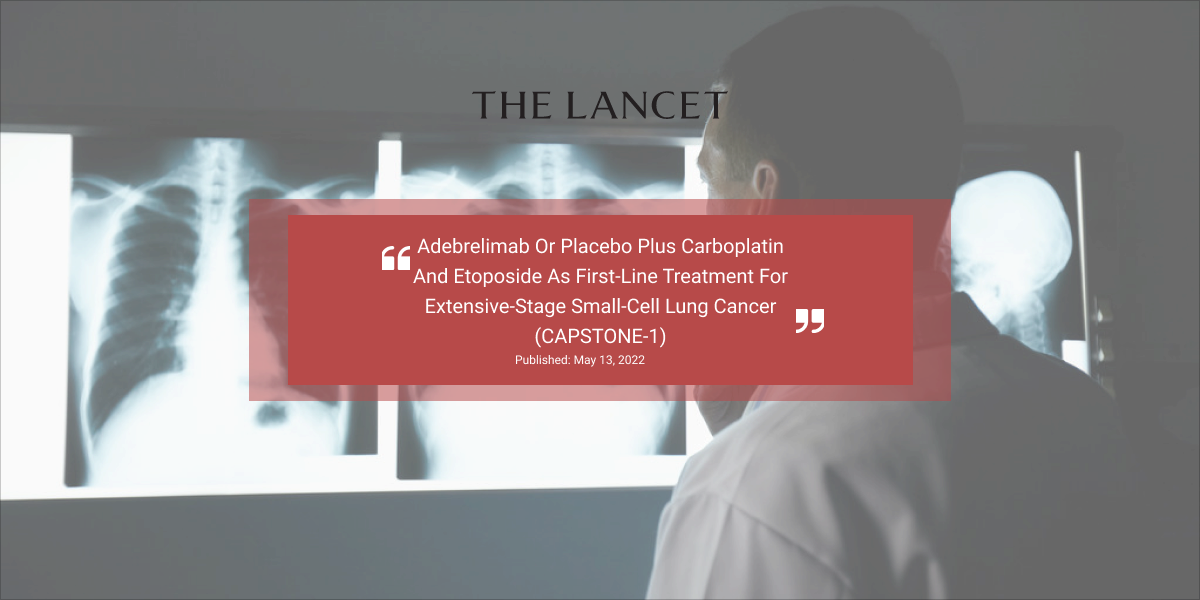Adebrelimab or placebo plus carboplatin and etoposide as first-line treatment for extensive-stage small-cell lung cancer (CAPSTONE-1): a multicentre, randomised, double-blind, placebo-controlled, phase 3 trial

Adebrelimab or placebo plus carboplatin and etoposide as first-line treatment for extensive-stage small-cell lung cancer (CAPSTONE-1): a multicentre, randomised, double-blind, placebo-controlled, phase 3 trial
BACKGROUND
21
METHODS
The CAPSTONE-1 study was a randomised, double-blind, placebo-controlled, phase 3 trial, done in 47 tertiary hospitals in China. Key inclusion criteria were patients aged 18–75 years, with previously untreated histologically or cytologically confirmed ES-SCLC and an Eastern Cooperative Oncology Group (ECOG) performance status of 0–1. Eligible patients were randomly assigned (1:1) to receive four to six cycles of carboplatin (area under the curve of 5 mg/mL per min, day 1 of each cycle) and etoposide (100 mg/m2 of body-surface area, on days 1–3 of each cycle) with either adebrelimab (20 mg/kg, day 1 of each cycle) or matching placebo, followed by maintenance therapy with adebrelimab or placebo. All treatments were given intravenously in 21-day cycles. Randomisation was done using a centralised interactive web response system with a block size of four, stratified by liver metastases, brain metastases, and lactate dehydrogenase concentration. The primary endpoint was overall survival in patients who received at least one dose of study medication. Safety was analysed in the as-treated population. This study is complete and registered with ClinicalTrials.gov, NCT03711305.
FINDINGS
Between Dec 26, 2018, and Sept 4, 2020, 462 eligible patients were enrolled and randomly assigned: 230 (50%) patients received adebrelimab plus chemotherapy (adebrelimab group) and 232 (50%) patients received placebo plus chemotherapy (placebo group). At data cutoff (Oct 8, 2021), median follow-up was 13·5 months (IQR 8·9–20·1). Median overall survival was significantly improved in the adebrelimab group (median 15·3 months [95% CI 13·2–17·5]) compared with the placebo group (12·8 months [11·3–13·7]; hazard ratio 0·72 [95% CI 0·58–0·90]; one-sided p=0·0017). The most common treatment-related grade 3 or 4 adverse events were decreased neutrophil count (174 [76%] patients in the adebrelimab group and 175 [75%] patients in the placebo group), decreased white blood cell count (106 [46%] and 88 [38%]), decreased platelet count (88 [38%] and 78 [34%]), and anaemia (64 [28%] and 66 [28%]). Treatment-related serious adverse events occurred in 89 (39%) patients in the adebrelimab group and 66 (28%) patients in the placebo group. Four treatment-related deaths were reported: two each in the adebrelimab group (respiratory failure and interstitial lung disease and pneumonia) and placebo group (multiple organ dysfunction and unknown cause of death).
INTERPRETATION
Adding adebrelimab to chemotherapy significantly improved overall survival with an acceptable safety profile in patients with ES-SCLC, supporting this combination as a new first-line treatment option for this population.
FUNDING
Jiangsu Hengrui Pharmaceuticals.
![]() Prof Jie Wang, MD, Prof Caicun Zhou, MD, Prof Wenxiu Yao, PhD, Prof Qiming Wang, MD, Xuhong Min, BS, Prof Gongyan Chen, MD, et al.
Prof Jie Wang, MD, Prof Caicun Zhou, MD, Prof Wenxiu Yao, PhD, Prof Qiming Wang, MD, Xuhong Min, BS, Prof Gongyan Chen, MD, et al.
© 2022 Elsevier Ltd. All rights reserved.

